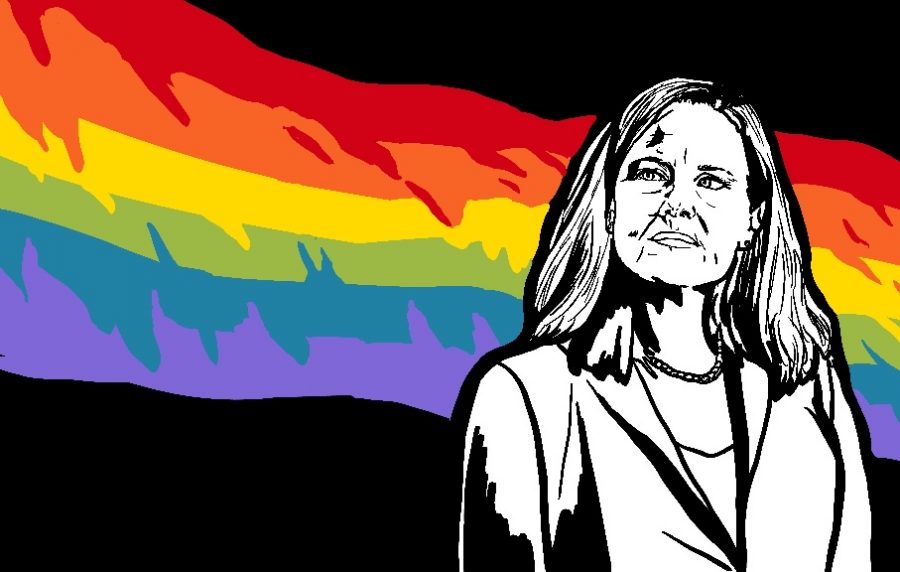OPINION: Amy Coney Barrett will roll back LGBTQ+ rights
Barrett’s nomination may indicate bad things for minorities, LGBTQ+ Americans
Amy Coney Barrett’s nomination to the Supreme Court signals a new wave of conservative decisions from the judicial branch. It’s conceivable that LGBTQ+ rights will be taken away because of her nomination.
November 5, 2020
Amy Coney Barret’s contentious confirmation to the Supreme Court is changing the course of politics.
On Oct. 26, Amy Coney Barrett was confirmed with a 52-48 vote. Barrett has more conservative views than most of the other justices, and she is the third conservative judge appointed by President Donald Trump to the Supreme Court. Trump is fulfilling his promise of making a more conservative Supreme Court this presidential term.
Although some might view this as having more diversity in the Supreme Court, Barrett has threatened several rights, especially among women and the LGBTQ+ community. Barrett has made several comments in the past that have led many to believe that she might fight to overturn Roe v. Wade and Obergefell v. Hodges, which legalized same-sex marriage.
As a member of the LGBTQ+ community who identifies as a lesbian and a biological woman, Barrett’s nomination is a threat to my rights and others I know.
Alana Hall, sophomore psychology major, said they were worried about Barrett’s rulings on LGBTQ+ rights.
“Her conservative policies, especially regarding the LGBTQ+ community, make me worry about the basic rights for people in any sort of minority group,” Hall said. “I’m concerned about how she will affect this generation’s future. I hope to see less polarized politics in the future of this country because the divide is enormous and extraordinarily unhealthy.”
Many students agree that Barrett’s appointment could mean bad things for minorities in this country.
“I think one of the biggest things, [is] the fact that she’s a conservative and a pro-lifer, just because … there are already conservatives and those kinds of beliefs in our judicial system and it’s like, we also need support of people who are pro-choice and pro-feminist beliefs,” Kayla Dacarus, senior psychology major, said.
Dacarus said Barrett’s decisions might have more of an impact than we think.
“The ruling goes on forever, that influences other cases, so you know, if she rules against pro-choice, whatever she chooses, that goes on to other cases,” Dacarus said.
Dacarus said her generation reacts differently and more progressively to politics than her parents may have.
“I think our generation has become so progressive, in a way, it’s become very familial, because we are all starting to look out for each other, especially young people, such as the LGBTQ+ community and race,” Dacarus said. “You take these old, originalist beliefs, it feels like we are taking a step back from what we have already built.”
She said politics should become more focused on the individual, rather than larger groups.
“America is so diverse, and it’s so detrimental when you do politics with bias and politics with your own beliefs and forcing those beliefs on everyone else,” Dacarus said. “I hope in the future that politics can actually become non-partisan.”
Members from my generation and myself are concerned about the future of politics. I hope that my rights are not taken away, and I hope I can exercise my freedoms, such as same-sex marriage, in the future.


















Fred • Nov 8, 2020 at 2:07 pm
The best thing is that she is just one vote on SCOTUS. With two misogynist and probable serial sexual predators on her side (Thomas and Kavanagh), yes, it’s clear that a lot of civil rights are at stake here. However, I suspect Roberts and Gorsuch will join the progressive judges more often than people think, because Roberts won’t want his legacy to be one of a partisan hack—and that the Dems will impeach Kavanagh in the spring. Either way, this nomination process was the strategy of the “old guard” losing their grip. McConnell rushed this process because ultimately he believed they were going to lose on November 3. This was his last-ditch effort to install minority-rule, which the American people will not stand for long term.